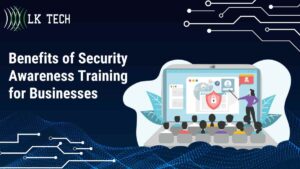The Benefits of Security Awareness Training: A Comprehensive Guide for Businesses
Security awareness training has become a critical part of cybersecurity for companies in the digital age. This comprehensive guide examines the key benefits of security awareness training for businesses of all sizes and across all industries.

- Benefits of Security Awareness Training for Businesses
What is Security Awareness Training?
Security awareness training educates employees on how to identify and respond to the ever-evolving cyber threats targeting an organization's data, systems, and operations. Through formal training programs, staff members learn about different cyber attack methods like phishing, malware, ransomware, social engineering, and more. Training also covers cybersecurity best practices for daily activities like setting strong passwords, securely handling mobile devices, identifying suspicious emails, and browsing the web safely.
Businesses usually provide ongoing security awareness training as a core component of a larger cybersecurity strategy. When conducted consistently on a quarterly or even monthly basis, security training reinforces a culture of cyber awareness across the entire organization. From the mailroom clerk to the CEO, security is everyone's responsibility.
Comprehensive awareness training programs utilize a blend of delivery methods for maximum effectiveness. Well-designed courses combine interactive eLearning modules, in-person workshops, simulated phishing attacks, engaging videos, posters, newsletters, and reminders. Repetition through multiple mediums drives the retention and application of cyber best practices.
Top 5 Benefits of Security Awareness Training
| Benefit | Description |
| 1. Raises Employee Cybersecurity Awareness | With https://www.proofpoint.com/us/security-awareness/human-factor, people represent the weakest link in cyber defenses. Security awareness training arms staff with the knowledge needed to identify risks and make smart security decisions. Employees who complete training gain confidence in spotting suspicious emails, unsafe web links, malware infections, and other cyber attack vectors. |
| 2. Reduces Successful Cyber Attacks | Informed employees provide an extra layer of protection against sophisticated cyber threats targeting an organization’s data and systems. Workers well-versed in security best practices are far less likely to fall victim to social engineering and malware attacks. This significantly decreases the chances of threat actors gaining the initial network foothold required to perpetrate large-scale breaches. |
| 3. Ensures Business Continuity | Successful cyber attacks often interrupt normal business operations for hours, days, or longer. Costly downtime is frequently required to fully investigate, contain, and recover from a breach incident. However, employees trained to consistently avoid risky security behaviors greatly reduce the likelihood of an attack occurring in the first place. Keeping critical systems online and functioning without disruption avoids expenses related to incident response and lost productivity. |
| 4. Strengthens Compliance | For companies handling sensitive data like healthcare records, financial information, or intellectual property, regulatory compliance is mandatory. Security awareness training ensures staff thoroughly understand policies and procedures for properly handling protected data. This prevents compliance violations that can lead to steep fines, legal action, and damage to an organization's reputation. Program participation also demonstrates a proactive security stance for audits. |
| 5. Builds Customer Trust | In today's world, customers increasingly concerned about cyber risks favor vendors with robust security postures. Ongoing security awareness training provides assurance to clients that a company takes employee education and proactive threat prevention very seriously. This boosts customer confidence that their sensitive data will remain protected. |
The Ideal Security Awareness Training Program
To maximize the benefits outlined above, businesses should implement a layered security awareness training curriculum with the following components:
- Initial onboarding training - All new hires should complete foundational cybersecurity training to learn company policies, top risks, and basic precautions.
- Ongoing simulated phishing - Regular simulated phishing attacks let employees safely experience the latest real-world threats. Detailed reporting identifies vulnerable users needing additional coaching.
- Quarterly refreshers - Short security refreshers every quarter reinforce the most critical topics and emerging threats employees face.
- Role-based training - Tailored training tracks ensure staff in key roles like finance, HR, and executives learn threats and policies specific to their responsibilities.
- Microlearning - Brief (3-5 minute) on-demand cybersecurity lessons provide quick refreshers and build long-term retention of concepts.
- Gamification - Games, quizzes, and rewards programs introduce a fun element that boosts engagement with training content.
- Poster campaigns - Eye-catching posters placed in common areas serve as constant reminders of security best practices for employees.
- Lunch and learns - Occasional in-person, instructor-led sessions dive deeper into topics like safe social media use, mobile security, and identifying phishing.
- New hire orientation - Introduce new employees to the company's cybersecurity culture and priorities on day one.
- Security newsletters - Regular email updates highlight new threats, successful training metrics, and upcoming activities to maintain awareness.
Conclusion
As this comprehensive guide outlined, consistent security awareness training centered on people offers tremendous value for organizations aiming to enhance cyber defenses in today's threat landscape. Beyond just technology, companies must invest in properly educating employees to create a resilient security culture able to withstand modern attacks.
Ongoing training that reduces human risk factors prevents breaches and the costly consequences that follow - from notification expenses to reputational damage to legal liabilities. For long-term success against ever-evolving cyber risks, layered security awareness training focused on building employee mindfulness is a strategic necessity.
The ideal awareness training program combines various educational touchpoints to equip the workforce with cyber skills applicable to their daily responsibilities. When security becomes part of company culture through engaging training, employees transform into a strong last line of defense against complex threats.
At LK Tech IT company in Cincinnati, we provide top-notch support tailored to your specific needs, ensuring your systems are secure and running smoothly. For more information on partnering with an experienced IT company. Contact us today to discover how we can assist your business.


